The pubcaster enlists writer Iris Yamashita
to tell a timeless story of sacrifice, honor and engagement.
Next month, the British Broadcasting System will be releasing a new, six-part audio drama for its millions of listeners worldwide. Its subject matter: the 100th Battalion/442nd Regimental Combat Team.
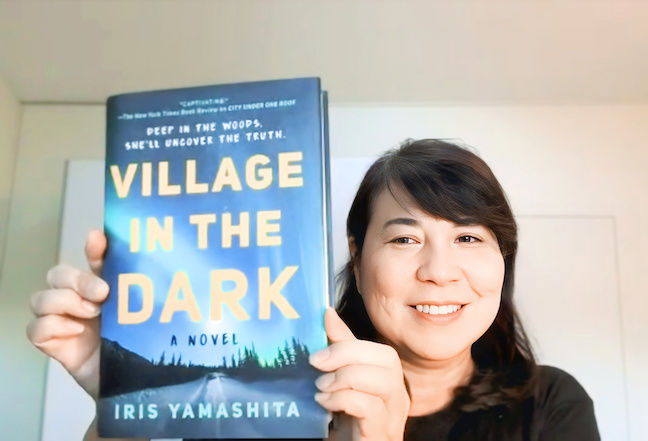
Zoom session screenshot of Iris Yamashita in Porto, Portugal, holding up a copy of her latest mystery novel, “Village in the Dark.” (Photo: George Toshio Johnston)
According to the series’ producer, Catherine Bailey, the first episode of “Purple Heart Warriors” will drop on Dec. 9 via the BBC World Service on its traditional radio airwaves and as a podcast on BBC Sounds. The title is, of course, a nod to the 100th Battalion, the predecessor to the 442nd, which got nicknamed the Purple Heart battalion for the staggering number of Purple Hearts its members were awarded.
Bailey, a London-based independent producer, was tapped to tell the story of the World War II-era segregated U.S. Army unit, comprised mostly of second-generation Japanese Americans from Hawaii and the U.S. mainland, by commissioning editor Simon Pitts. Although she was immediately taken by the story, she had no prior knowledge of the 442nd — and was confident that most of her countrymen were also unaware of the it. “I can pretty much say that I don’t know anybody that would know this story this side of the pond,” she told the Pacific Citizen.
For Bailey, it was a positive to be able to tell a novel story in a novel way to the Beeb’s multitudes of listeners. “I thought, ‘Well, first of all, it’s an extraordinary story,’ ” she said. Her next thought: “How on earth do we do it?” This, despite having by her own count having produced more than 500 hours of programming for the BBC.
Related story: Keeping the Aloha Spirit Alive (Nov. 1, 2024)
Other JA Veterans news: JA Vietnam Vets Get Their Close-Up (Nov. 1, 2024)
“I didn’t know any Japanese actors, I didn’t know any Japanese writers and I felt daunted by it, to be honest,” she said. Fortunately, Bailey found an ally: Academy Award-nominated writer Iris Yamashita, who penned the screenplay for the 2006 motion picture “Letters From Iwo Jima.”
“Best thing I ever did,” said Bailey. “I absolutely loved working with her.”
“I was living in Los Angeles when she approached me,” said Yamashita via Zoom, a reference to how she has since moved to Porto, Portugal. In addition to scriptwriting, she has also written for the stage and embarked on a career as a mystery writer. Her titles include her newest, “Village in the Dark,” and “City Under One Roof,” which was nominated for a Barry Award (for crime novels) and an Anthony Award (for mystery writers).
But “old-style” radio dramas? That was new to Yamashita. But with the guidance of a veteran producer in the genre in Bailey, she was up for the challenge of exercising a different muscle. “I thought, ‘Well, yeah, I could have a crack at this, I can give it a go.’”
That was in 2023. Over a six-month period, Bailey and Yamashita worked on the scripts, with Yamashita doing her research, using books like Orville Shirey’s “Americans: The Story of the 442nd Combat Team” and resources like Densho’s oral histories from those who served in the 442, plus people who told her their personal stories. All this while Yamashita was in the process of moving to Europe.
Bailey, meantime, had a cast to assemble. Asked how important it was to actually use actors of Japanese ancestry for the Japanese and Japanese American roles, Bailey had a one-word answer: “essential.” Elaborating, she said, “Well, you wouldn’t dream of casting anybody that wasn’t. … You wouldn’t be able to get away with it for a start, but you just wouldn’t.”
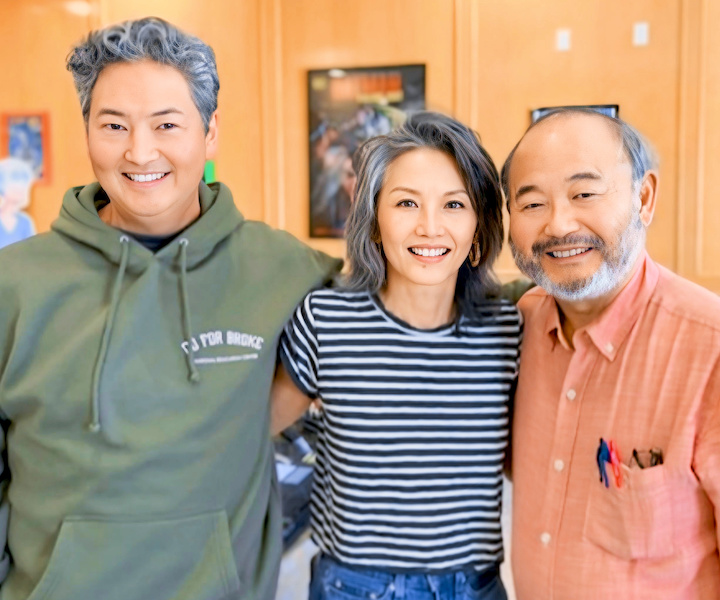
Actors Aaron Ikeda, Tamlyn Tomita and Clyde Kusatsu (Photo: Courtesy of Aaron Ikeda)
Enlisting the help of actress Tamlyn Tomita, Bailey was able to gather a cast of ethnic-appropriate talent from the U.S, with Bailey working on finding Japanese British acting talent. (Yes, there is such a thing.) Cast members included Aaron Ikeda (Nui Louie, Mr. Okimura), Kurt Kanazawa (Sonny), Conrad Lihilihi (Boxer, Crooner), Derek Mio (Barry, Capt. Kim), Tomita (Mrs. Tanaka, Baachan), Clyde Kusatsu (Grandpa Allen) — and in the lead role of Ken Morioka, Akie Kotabe, a Shin-Nisei born in Michigan, raised in Missouri and Texas and now a holder of a British passport.
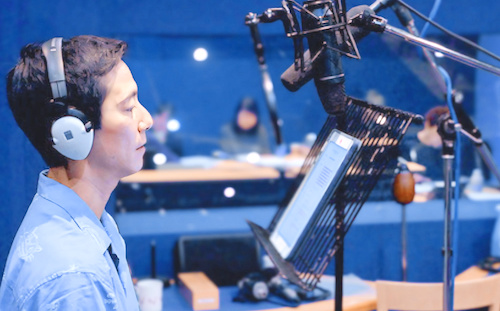
Akie Kotabe records his role as Ken Morioka in London for “Purple Heart Warriors.” (Photo: Courtesy of Catherine Bailey)
Kotabe, who pronounces his first name “Ah-Key,” emphasis on the second syllable, had originally been tapped to play a character named Shorty. Then he got promoted to the lead character of Ken. As for the story the series tells, he said, “It has a good kind of call-to-action message that resonated with me.” And, thanks to his years of living and working as an actor in Los Angeles, he had had some prior knowledge of the 442.
“I was really surprised how many of the cast had some connection to the 442, with their grandparents or an uncle or somebody in their family who actually served in the 442,” Yamashita said. A case in point was Hawaii-born veteran character actor Kusatsu. “My uncle was in the 100th Battalion, and my father, of course, was in the 442nd,” he said. After the war, his uncle, Tommy Kakesako, and his brother started Kakesako Brothers Jewelry on Alakea Street in Honolulu. “They were there for a very, very long time.”
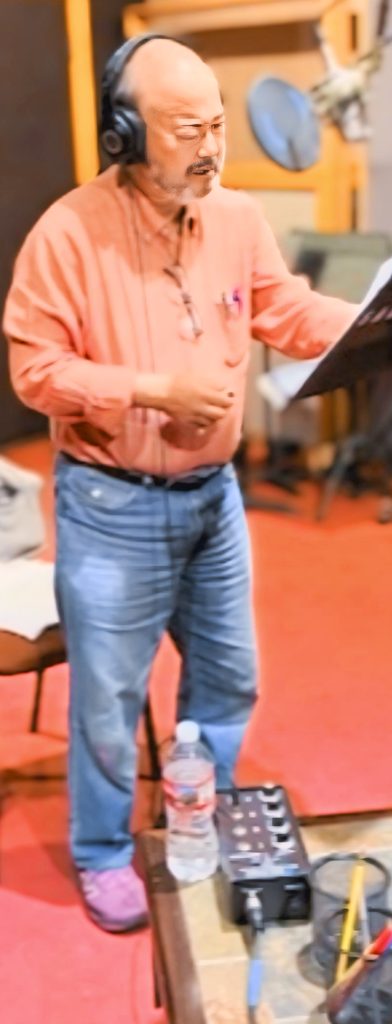
Clyde Kusatsu records his role as Grandpa Allen for “Purple Heart Warriors.” (Photo: Courtesy of Aaron Ikeda)
The recording process was a bit of a challenge, with sessions taking place over the summer at Salami Studios in North Hollywood, Calif., and in London. Yamashita, who was en route to Portugal, was able to attend the London sessions in person. “Simultaneously recording in two different countries/time zones was a unique experience,” she noted in an email. And, according to Bailey, they found in actor Will Sharpe (“The White Lotus”) someone to serve as the narrator for the series.
Back to the writing, Bailey said one of the challenges they faced was how to tell this story. For Yamashita, she had to figure out which approach to take. “I had thought of two different ways of telling it. I thought your normal war story where you have the old man looking into his past,” she said. But she also had an “out-of-the-box” approach that she pitched, one that involved what she called “some time-jumping.” That was the route they chose to take.
“Purple Heart Warriors” begins in present-day Little Tokyo. Ken is a young, complacent guy, uninterested in politics or history and who personally knows nothing about WWII. That complacency is shaken when Ken essentially becomes his grandfather — and finds himself detained in a concentration camp for Japanese Americans, circa 1943.
It’s only then that Ken learns about what his grandfather and that generation endured and sacrificed for him and his generation. For Bailey and Yamashita, that was the deeper message they wanted to convey that is relevant for today. “Why were these people fighting?” Bailey asked. “They were fighting for their own identity, but they were also fighting for democracy, and they were fighting for a free country.”
“We can’t forget the past,” said Yamashita. “Otherwise, we’ll keep making the same mistakes of the past.”
For Bailey, one of the messages she hopes “Purple Heart Warriors” conveys is getting the younger generations to engage. “The message is to wake up and stop being complacent about the world and take an active interest, just like these young men did in the war when they fought for freedom and democracy.
For Kusatsu, despite his decades of acting experiences, performing in a radio play/podcast was a first, despite having a résumé that includes voice acting for animation. That his first foray into this genre tells the story of the 442 makes it extra special.
“I think it’s a very positive thing. It’s a constant update on a story that should not be ever forgotten,” he said. “Everything is much more relevant these days, and each part of the story needs to be retold and retold and retold. And if it’s going to be through the BBC as radio play, then that’s great.”
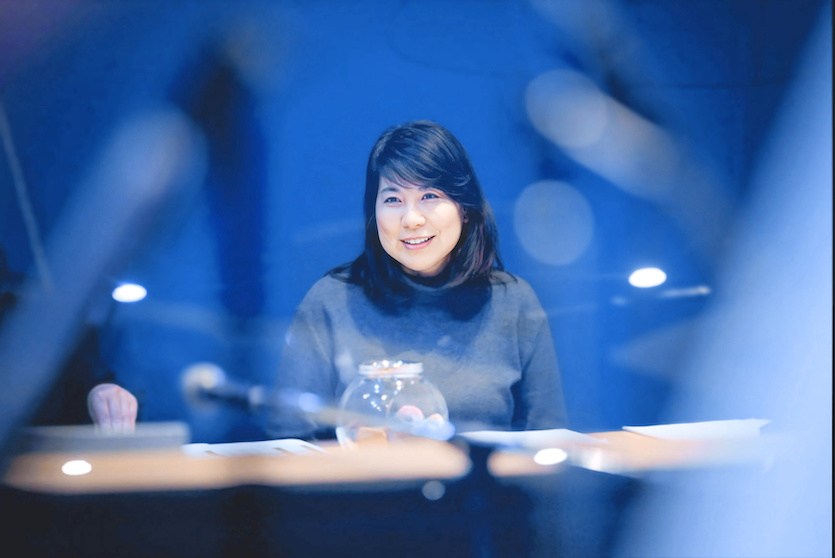
“Purple Heart Warriors” writer Iris Yamashita in London during the radio drama’s recording session (Photo: Courtesy of Catherine Bailey)



